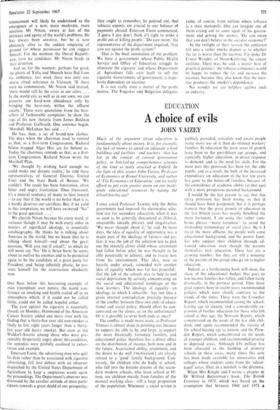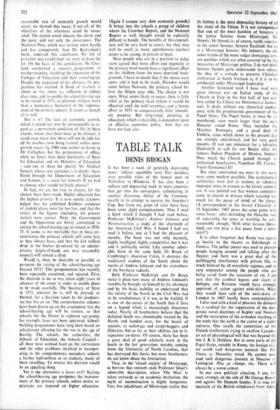A choice of evils
EDUCATION JOHN VAIZEY
Much of the argument about education is fundamentally about money. It is, for example, the lack of money to spend on adequate school buildings and facilities—and teachers—that has led, in the context of current government policy, to botched-up comprehensive schemes of the kind so justly attacked at Enfield. In the light of this, argues John Vaizey, Professor of Economics at Brunel University, and author of The Economics of Education,' can we really afford to put even greater strain on our inade- quate educational resources by raising the school-leaving age?
I once asked Professor Tawney why the Attlee government had imposed the eleven-plus selec- tion test for secondary education, when it was so soon to be generally denounced as illiberal, unscientific (deadly phrase), and inegalitarian. `We never thought about it,' he said. In those days, the idea of equality of opportunity was a major part of the ideology of fairness and jus- tice; it was the job of the selection test to pick out the innately clever child whose attainment had fallen below what he was thought to be able potentially to achieve, and to rescue him from his environment. This idea, now so heavily under attack, coincided with another idea of equality which was far less powerful: that the job of the schools was to help to end social deprivation by actively concentrating on the social and educational handicaps of the slow learners. The ideology of equality—an ideology to which I subscribe—has run into a grave internal contradiction precisely because of the conflict between these two ends of educa- tional and social policy. Should effort be con- centrated on the clever, or on the unfortunate? Or is it possible to serve both ends at once?
The conflict is made more acute, as Professor Titmuss is almost alone in pointing out, because to support the able is, by and large, to support the more financially fortunate families, and educational policy therefore has a direct effect on the distribution of income, both now and in the future. Ascertained ability, attainment, and the desire to do well ('motivation') are closely related to a 'good' family background. Con- versely, the children who do badly at school, who fall into the bottom streams of the secon- dary modern schools, who leave school at fif- teen, are children mainly from families of the manual working class—still a large proportion of the population. Whenever a social service is publicly provided, articulate and aware people make more use of it than do manual workers' families. In education the great areas of growth have been in the post-fifteen age groups, and especially higher education, in direct response to demand, and to the need for skills. For the most part this provision has been for the able pupils; and as a result, the bulk of the increased expenditure on education in the last ten years has gone to the better-off families, because of the coincidence of academic ability (at that age) with a more prosperous parental background.
I would be the last person to say that this extra provision has been wrong, or that it should have been postponed; but it is perhaps ironical that the great growth of education in the last fifteen years has mainly benefited the more fortunate. I am using this rather cum- brous phrase—`more fortunate'--to avoid the misleading terminology of social class. By it I mean the more affluent, the people with some educational background, and the poorer fami- lies who support their children through ad- vanced education even though the parents themselves lack education. These last are a growing number; but they are still a minority of the parents of the group who go on to higher education.
Indeed, as a forthcoming book will show, the share of the educational budget that goes to low-income families has fallen, and fallen fairly drastically, in the postwar period. Thus three great reports have in recent years recommended policies which were clearly contrary to the trends of the times. These were the Crowther Report, which recommended raising the school- leaving age to sixteen, and a considerable ex- pansion of further education for those who left school at that age; the Newsom Report, which concentrated on the needs of the less able chil- dren, and again recommended the raising of the school-leaving age to sixteen; and the Plow- den Report, which concentrated on the needs of younger children, and recommended priority to deprived areas. Although £16 million has been allocated to the building of primary schools in these areas, many times this sum has been made available for universities and colleges whose students come from the 'advan- taged' areas. That, in a nutshell, is the dilemma.
When Mrs Knight and I wrote a chapter in Dr Wilfred Beckerman's book, The British Economy in 1975, which was based on the assumption that between 1960 and 1975 a reasonable rate of economic growth would occur, we showed that many, if not all, of the objectives of the reformers could be recon- ciled. The nation could educate the clever and the poor, and not only the clever-poor. The National Plan, which was written more hastily and less competently than Dr Beckerman's book, endorsed this conclusion. No list of priorities was established; we were to have the lot. On the basis of this conclusion, Mr Cros- land accelerated a massive, programme of teacher-training, involving the expansion of the Colleges of Education and their crowding-up. Despite the scepticism of his advisers, the pro- gramme has worked. A flood of teachers is about to rise about us, sufficient to reduce class sizes, and to enable the school-leaving age to be raised in 1971, as planned, without more than a momentary hesitation in the improve- ment of the primary schools. It seems as though all is well.
But is it? The lack of economic growth, which it would not now be unreasonable to re- gard as a permanent condition of life in these islands, means that there have to be choices; it could even mean that there will not be jobs for all the teachers now being trained, unless some growth occurs by 1980 (one wishes no harm to Mr Callaghan, but his permanence of office, while no fewer than three Secretaries of State for Education and six Ministers of Education —and one of them the ghostly Mr Michael Stewart, whose very existence is in doubt—have flitted through the Department of Education and Science, is a cause for lament). If we had to choose, what would we 'freely choose?' ` In fact, we are not free to choose, for the choices have been made. Higher education has the highest priority. It is now openly acknow- ledged that the published Robbins estimates of student places were far too low, and that the critics of the figures (including the present writer) were correct. Next, the Government and the Opposition are firmly committed to raising the school-leaving age to sixteen in 1970- 71. It seems to me inevitable that in these cir- cumstances the primary schools will come last, as they always have, and that the f16 million drop in the bucket (produced by an admini- strative sleight-of-hand, one may reasonably suspect) will remain a drop.
Would it, then, be desirable or possible to postpone the raising of the school-leaving age beyond 1971? This postponement has receiitly been repeatedly examined, and rejected. First, the decision to do so was taken eight years in advance of the event in order to enable plans to be made carefully. The Secretary of State in 1971, whoever he is, will be praised, or blamed, for a decision taken by his predeces- sor but five or six. The comprehensive schemes have been drawn up on the assumption that the school-leaving age will be sixteen, so that schools for the fifteen to eighteen age-group, for example, have not been approved. School- building programmes have long been based on calculations allowing for the rise in the age of leaving. The schools, the authorities, the Schools of Education, the Schools Council— all these have worked hard on the curriculum and the other problems involved in incorpor- ating in the comprehensive secondary schools a further half-million or so students, many of them unwilling. To reverse this decision would be an appalling thing.
Yet is the alternative a lesser evil? Raising the school-leaving age postpones the improve- ment of the primary schools, unless severe re- strictions are imposed on higher education.
(Again I assume very slow economic growth.) It brings into the schools a group of children whom the Crowther Report, and the Newsom Report as well, thought would be especially difficult to handle. The benefits of this expendi- ture will be very hard to assess, but they may well be small, as many apprehensive _teachers seems to be saying, in private at least.
Most people who are in a position to judge seem agreed that more effort and ingenuity at the primary level would have a significant effect on the children from the more deprived back- grounds. I have no doubt that if the choice were open, and it had to be made, Plowden would come before Newsom, the primary school be- fore the fifteen year olds. The choice is not open. What seems likely to occur, then, is little relief at the primary level (where it would be effective) until the mid-'seventies; and a heroic effort in 1971 to comparatively little immedi- ate purpose. But long-range planning in education, which is desirable, is dependent upon an effective economic policy. And that we have not had, alas.



































 Previous page
Previous page